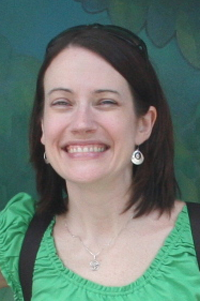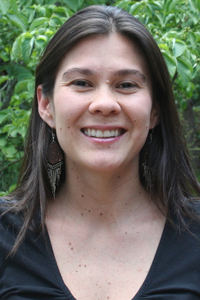PASOs expanding statewide as Latino population grows, services needed
June 23, 2010

Julie Smithwick-Leone

Margarita Franco
When Julie Smithwick-Leone graduated with a master’s degree in social work from the University of South Carolina in 2005, she didn’t realize that her education and experience would put her at the forefront of a public health need with statewide ramifications.
But with the burgeoning Latino population in South Carolina, Smithwick-Leone found that her education, cultural knowledge, and fluency in Spanish were vital as state healthcare professionals and agencies were beginning to assess maternal and child health services for Latina women. In her master’s degree program, Smithwick-Leone already had completed a needs assessment for Latina healthcare. She began working at Palmetto Health Richland and secured a $25,000 grant from the March of Dimes to teach prenatal education in Spanish with small groups of Latina women in the Midlands region of South Carolina.
Her work was timely: South Carolina has one of the nation’s fastest growing Latino populations. The birth rate is double that of whites and African Americans.
Word of Smithwick-Leone’s work also caught the attention of healthcare professionals at the S.C. Department of Health and Environmental Control (DHEC) and USC’s Arnold School of Public Health.
“We realized that while there were some resources and bits of information available to women, most of them didn’t know where to go for help and who to trust to ask personal questions,” said Smithwick-Leone, program director for PASOs (Perinatal Awareness for Successful Outcomes).
“They had questions about their eligibility for services, nutrition during pregnancy, breastfeeding versus formula, proper care for their newborn babies, and many other concerns,” she said. “They were eager to do what was best for their pregnancies and infants, but they wanted information from sources that they could trust.”
And because many of the women had their mothers and other family members remaining in their native countries, they often felt isolated from the people whom they could depend on for care and support.
That first grant helped Smithwick-Leone partner with the S.C. Public Health Institute at the Arnold School to earn another from The Duke Endowment. By spring 2008, PASOs became part of SCPHI and also had begun an affiliation with the Consortium for Latino Immigration Studies. The program, which initially was established to serve women in Richland and Lexington counties, has expanded quickly to Greenville, Beaufort, Jasper, Newberry, Saluda, Clarendon and Dillon counties. A PASOs program for Charleston, Berkeley and Dorchester counties will be inagurated later this summer.
“PASOs provides women with 14 hours of class time. The curriculum covers topics such as health and nutrition for pregnant women, breastfeeding, symptoms that require medical attention, labor and delivery, information on breastfeeding, care of an infant, available resources, and tips on navigating the U.S. healthcare system”, said Margarita Franco, program coordinator for PASOs in Richland and Lexington counties.
“Families are invited to attend,” Franco said, “and fathers often come to learn how they can be part of an infant’s care. Women get to know one another and form social networks, which draw many participants out of isolated situations.”
The program, developed with input from Latina women for Latina women, focuses on the strengths, beliefs, and concerns of the culture. “Everything that we do is immersed in the community’s needs and realities,” said Smithwick-Leone. “This is an important time in these women’s lives, and we want to ensure that they have information on how to have a successful and healthy pregnancy.”
Brenda Martin, director of the Bureau of Maternal and Child Health at the S.C. Department of Health and Environmental Control, said PASOs offers an excellent opportunity to collaborate and focus on the maternal and child health needs of the Latino population.
“Latino culture requires a voice of trust; PASOs affords the population that voice, ultimately creating a link to healthcare,” Martin said.
PASOs provides cultural competency training for providers that work with Latino patients, especially with mothers and babies, Franco said.
The PASOs program also takes its messages and materials to the Latino community, to places where community members live, work, dine, and shop. The local PASOs coordinator and volunteers distribute folic acid vitamins and are available for private consultation and to register pregnant women for the prenatal course.
Outreach events are held in libraries, schools, health centers, churches, Latino-owned businesses, and recreation programs.
And while PASOs has an established curriculum, the PASOs model can be fitted to meet the needs in each specific county.
“Beaufort County, for example, has both urban and rural areas,” Smithwick-Leone said. “The model and training are the same for all the program coordinators. But the model can be adapted to meet the needs at each site. After all, a community’s healthcare services, organizational partners and Latino populations may be different. In the Midlands, we have many doctors’ offices and large hospitals. Other communities have fewer healthcare providers and smaller hospitals. PASOs adapts to the needs of each county served.”
In the past year, PASOs staff provided the 14-hour prenatal education course to 298 Latinos, reached 2,310 people at outreach events and provided 2,611 individual interventions for Latina women and their families.
Smithwick-Leone said that PASOs helps assure that proper local and statewide resources are in place and functioning properly so that the specific needs of the Latino population are being met.
“Recent program evaluation data shows a major increase in knowledge and positive behavior intention by program participants,” she said.
The next step will include studying the cost effectiveness and the social networking that is emerging through the program.
“What we learn can serve as a model for other programs that serve Latinos throughout the United States,” she said.



_01.jpg)
_02.jpg)